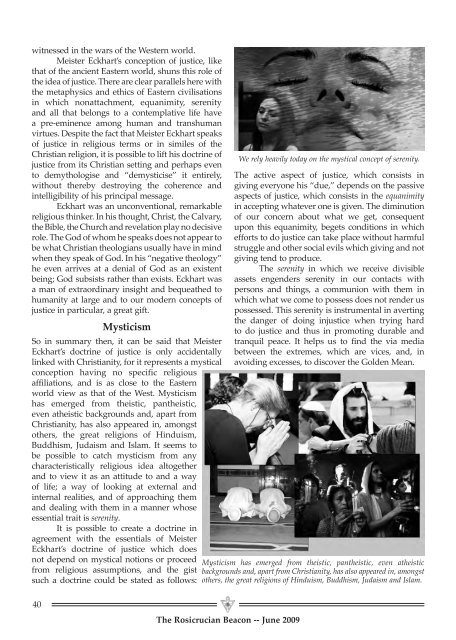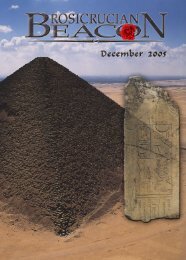RosicRucian - AMORC
RosicRucian - AMORC
RosicRucian - AMORC
- No tags were found...
You also want an ePaper? Increase the reach of your titles
YUMPU automatically turns print PDFs into web optimized ePapers that Google loves.
witnessed in the wars of the Western world.Meister Eckhart’s conception of justice, likethat of the ancient Eastern world, shuns this role ofthe idea of justice. There are clear parallels here withthe metaphysics and ethics of Eastern civilisationsin which nonattachment, equanimity, serenityand all that belongs to a contemplative life havea pre-eminence among human and transhumanvirtues. Despite the fact that Meister Eckhart speaksof justice in religious terms or in similes of theChristian religion, it is possible to lift his doctrine ofjustice from its Christian setting and perhaps evento demythologise and “demysticise” it entirely,without thereby destroying the coherence andintelligibility of his principal message.Eckhart was an unconventional, remarkablereligious thinker. In his thought, Christ, the Calvary,the Bible, the Church and revelation play no decisiverole. The God of whom he speaks does not appear tobe what Christian theologians usually have in mindwhen they speak of God. In his “negative theology”he even arrives at a denial of God as an existentbeing; God subsists rather than exists. Eckhart wasa man of extraordinary insight and bequeathed tohumanity at large and to our modern concepts ofjustice in particular, a great gift.MysticismSo in summary then, it can be said that MeisterEckhart’s doctrine of justice is only accidentallylinked with Christianity, for it represents a mysticalconception having no specific religiousaffiliations, and is as close to the Easternworld view as that of the West. Mysticismhas emerged from theistic, pantheistic,even atheistic backgrounds and, apart fromChristianity, has also appeared in, amongstothers, the great religions of Hinduism,Buddhism, Judaism and Islam. It seems tobe possible to catch mysticism from anycharacteristically religious idea altogetherand to view it as an attitude to and a wayof life; a way of looking at external andinternal realities, and of approaching themand dealing with them in a manner whoseessential trait is serenity.It is possible to create a doctrine inagreement with the essentials of MeisterEckhart’s doctrine of justice which doesnot depend on mystical notions or proceedfrom religious assumptions, and the gistsuch a doctrine could be stated as follows:We rely heavily today on the mystical concept of serenity.The active aspect of justice, which consists ingiving everyone his “due,” depends on the passiveaspects of justice, which consists in the equanimityin accepting whatever one is given. The diminutionof our concern about what we get, consequentupon this equanimity, begets conditions in whichefforts to do justice can take place without harmfulstruggle and other social evils which giving and notgiving tend to produce.The serenity in which we receive divisibleassets engenders serenity in our contacts withpersons and things, a communion with them inwhich what we come to possess does not render uspossessed. This serenity is instrumental in avertingthe danger of doing injustice when trying hardto do justice and thus in promoting durable andtranquil peace. It helps us to find the via mediabetween the extremes, which are vices, and, inavoiding excesses, to discover the Golden Mean.Mysticism has emerged from theistic, pantheistic, even atheisticbackgrounds and, apart from Christianity, has also appeared in, amongstothers, the great religions of Hinduism, Buddhism, Judaism and Islam.40The Rosicrucian Beacon -- June 2009











